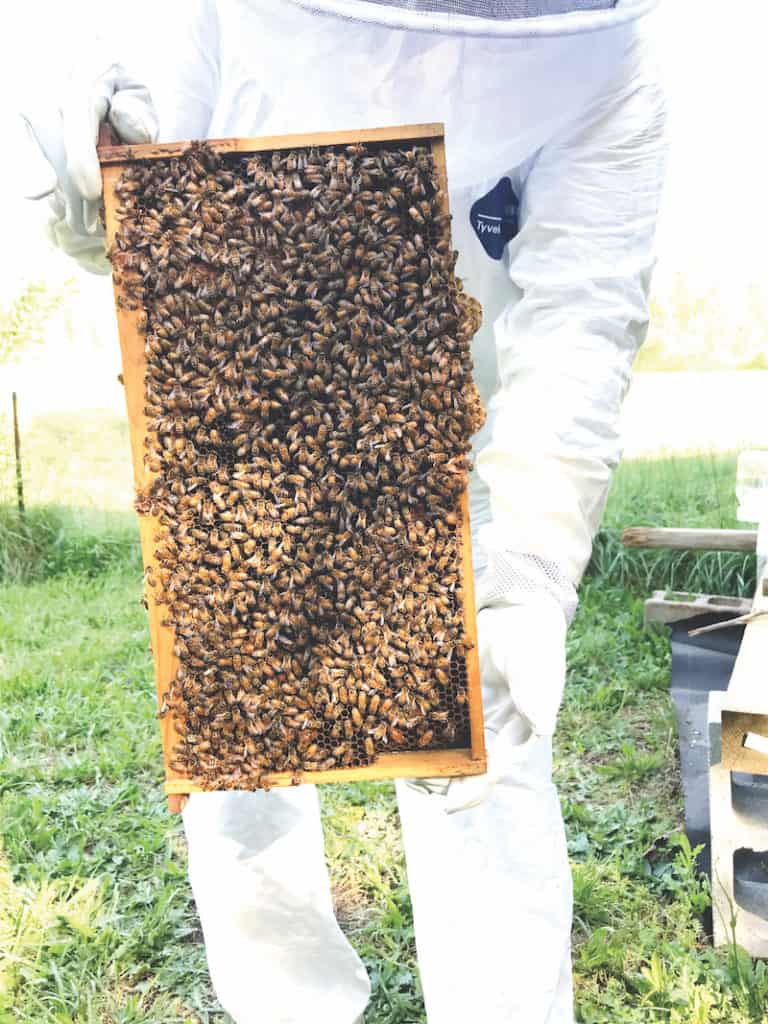In Northeast Georgia the hobby of backyard beekeeping is buzzing through communities large and small, picking up newcomers along the way and ushering them into a well-established beekeeping hive. A dedicated swarm of beekeepers is at the helm, tending their own hives while spreading their knowledge to future honeybee farmers.
To appreciate the hobby of backyard beekeeping, you must first understand why rational people engage with stinging insects for fun. Enlightenment comes through conversation with a beekeeper. Drew Harvey, president of the Lake Hartwell Beekeepers, explains: “When you start seeing how the bees operate, it’s a marvel.”
Many hobbyists remark on an enhanced connection to the natural world as a beekeeping side effect. More thoughtful consideration of temperature, blooming periods and seasonal rhythms is common to beekeepers. “You don’t miss a bloom when you’re a beekeeper,” reflects Katie Goodman, president of the Northeast Georgia Mountain Beekeepers.

Understanding why sensible people purchase 3-pound packages of bees – the beginnings of their backyard apiaries – brings further appreciation for the hobby. Family health prompted Mark Herndon of Franklin Springs to purchase his first hive in 2018. Seasonal allergies affect his family, and with local honey regarded by some as a remedy, he now raises honeybees at home in hopes of providing his family with relief. A Clarkesville-area beekeeper was delighted to receive honeybees for Christmas three years ago. Prompted by her dissatisfaction with a lackluster vegetable patch, she had asked for honeybees in hopes that they would bring life to her garden.
Yet another read an article about beekeeping while on a flight in the early 1980s. Upon returning home, he called a friend at the University of Georgia’s Cooperative Extension, who helped him get started.
If reading this article piques your interest but you don’t have an extension agent friend, worry not; Northeast Georgia is teeming with resources for beginners. While a lifetime of beekeeping literature can be found online and at the library, veteran apiarists recommend connecting with a local beekeeping organization to get started. Beekeepers will all face challenges from pests, weather and disease, but connecting with experienced beekeepers for troubleshooting makes success for the newcomer easier to attain. Northeast Georgia is home to more than 10 beekeeping clubs, with dozens more across the state. Visit the Georgia Beekeepers Association website for a list of clubs and their locations.
Harvey invites you to join Lake Hartwell Beekeepers. “We welcome experienced beekeepers, wannabe beekeepers, anybody.” Harvey’s welcoming words encompass the inclusive atmosphere of beekeeping clubs in general. Honeybee farmers enjoy sharing their craft – a fact that is exemplified by the attitude of Northeast Georgia Mountain Beekeepers President Katie Goodman: “Some people like to make honey. I like to make beekeepers.” Her club’s members range from beginners to veteran beekeepers, and many of the long-term members first joined as new beekeepers in need of mentors.
Beginner beekeeping courses are a staple of most clubs, many of which sweeten enrollment with a year-long club membership. Most beginner classes are taught early in the year, which is also the best time to start a new hive. The John C. Campbell Folk School (see the Holiday/Winter 2018-2019 issue) also offers beekeeping classes in an unforgettable setting, and residents of certain north Georgia counties are eligible for discounted tuition. Additional recommended resources include the Georgia Beekeepers Association, the UGA Honeybee Program and UGA’s Cooperative Extension.
Setting up a backyard beekeeping operation requires specialized equipment, all of which can be found at a handful of retail shops operating in Northeast Georgia. Several recommended beekeeping supply shops are Blue Ridge Honey Company in Lakemont, Beekeeping USA in Toccoa and Lanier Bee Barn in Commerce. Start-up beekeeping costs range from several hundred dollars, if used materials are available, to approximately $750 for new supplies. Some beginning supplies include a package of live bees, boxes and other wooden materials for creating a honeybee habitat, a bee smoker, and protective clothing.
Once a hive is humming, beekeepers prepare themselves for the harvest. Depending on the year, an average hive can be expected to produce over 50 pounds of honey – a sweet reward for the hard work backyard beekeepers put into their hobby.

Honey, of course, is the main attraction in terms of beekeeping bounty, and each season’s harvest yields a different flavor and texture of product. A typical year in Northeast Georgia brings three honey harvests: lighter flavored honey in the spring, a more complex-flavored summertime harvest and a deeply flavored honey “robbed” from the hive before the first frost. The most common honey flavor is “wildflower,” which is produced when free-range worker bees visit anything in bloom. Sourwood honey, a buttery seasonal favorite, is created when bees visit blooming sourwood trees exclusively. In addition to honey, other useful products harvested from the hive include bee pollen and beeswax.
For those who appreciate backyard beekeeping but prefer to leave the bee handling to friends and neighbors, there are plenty of ways to enjoy the harvest. Buying local raw honey ensures that you are getting a product that retains some beneficial ingredients that are lost through pasteurization. Backyard beekeepers also sell a range of finished products, from clean-burning beeswax candles to honey-infused bath products that will make you feel like a queen.
Many farmers markets and artisan shops sell local bee products, and if you know a backyard beekeeper personally, they’ll often sell directly to you. Another recommended resource for local honeybee products is the online shop Northeast Georgia Locally Grown. Lastly, for true beekeeping enthusiasts, a honeybee license plate will soon be available at your county tag office.
Whether you’re an aspiring backyard beekeeper, a veteran apiarist or someone who just enjoys locally sourced honey, Northeast Georgia is the perfect place to be(e)!